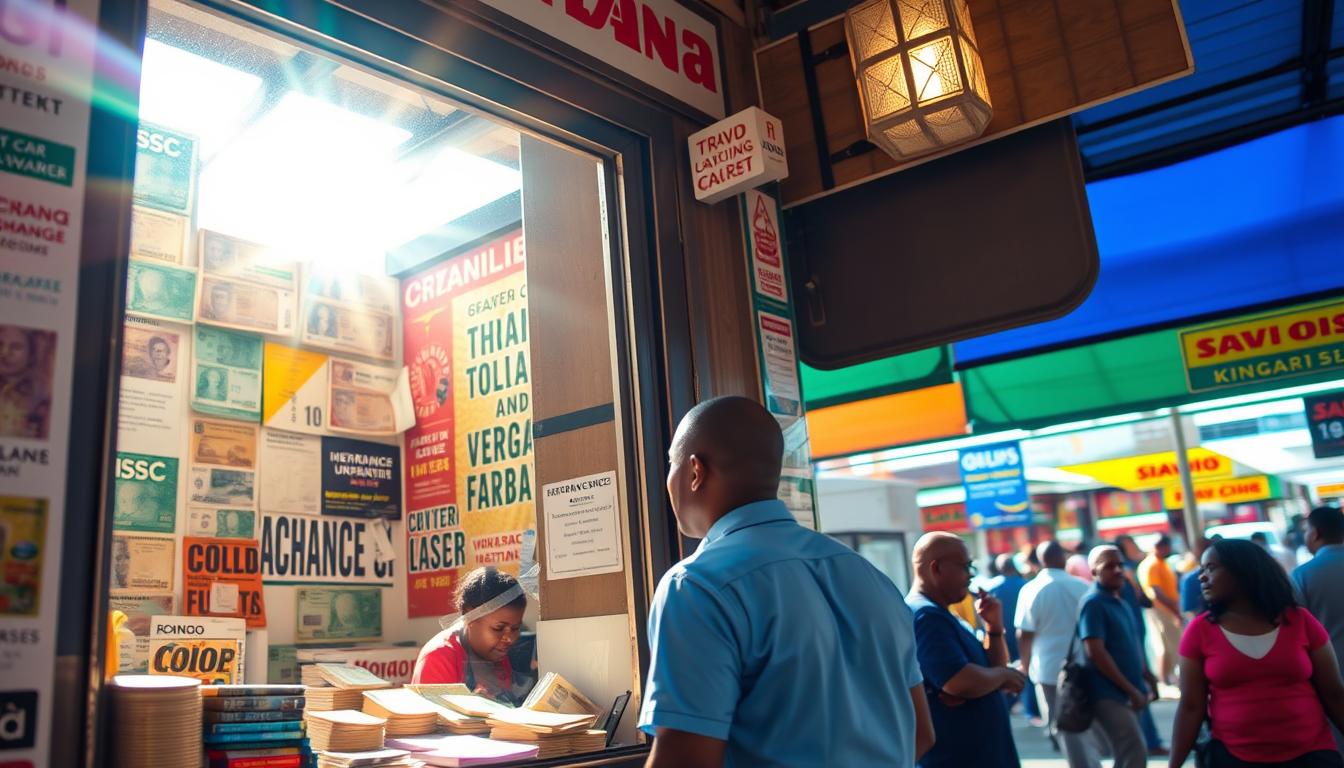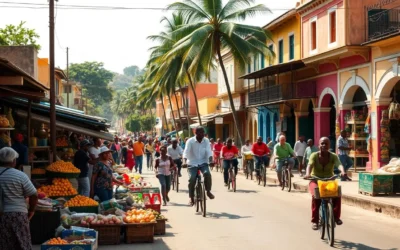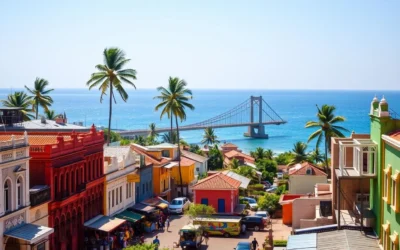✓ Accommodations✓ Flights✓ Rental Cars✓ Tours & Activities
Did you know that over 80% of transactions in this vibrant country are still conducted in cash? This makes understanding the local currency essential for a smooth trip. The official currency here is the Mozambican Metical (MZN), and knowing how to manage it can save you time and money.
Traveling abroad often comes with hidden costs like ATM fees and unfavorable exchange rates. But with the right tools, you can avoid these pitfalls. For example, using a travel card like the Wise Multi-Currency Card lets you convert money at competitive rates and minimize transaction fees.
This guide will walk you through everything you need to know about handling money here. From using ATMs to finding the best currency exchange options, you’ll learn practical tips to make your trip stress-free. Ready to take control of your spending? Let’s dive in!
Overview of Currencies and Payment Methods in Mozambique
Handling money wisely can make your trip smoother and more enjoyable. The official currency here is the Mozambican Metical (MZN), and it’s essential to understand how it works. Most transactions are cash-based, but cards are becoming more accepted in certain areas.
Mozambican Metical Essentials
The Mozambican Metical is divided into 100 centavos. It’s widely used for everyday purchases, from markets to restaurants. In southern areas, you might find South African Rands or US Dollars accepted at some hotels. However, it’s best to carry local currency for smaller transactions.
ATMs are available in major cities, but fees can add up. Notify your bank before using your card to avoid issues. For better exchange rates, consider converting money at banks or authorized exchange offices.
Common Local Payment Practices
Cash is king in most places, especially in rural areas. For larger purchases or at upscale hotels, credit cards are increasingly accepted. However, always have some cash on hand for small vendors or transportation.
Here’s a quick comparison of cash and card usage:
| Scenario | Cash | Card |
|---|---|---|
| Markets & Small Vendors | Preferred | Rarely Accepted |
| Hotels & Restaurants | Accepted | Increasingly Accepted |
| ATMs & Banks | Withdrawal Option | Primary Method |
By understanding these essentials, you can avoid unnecessary fees and make the most of your spending. Plan ahead to ensure a stress-free experience.
Managing Your Money on the Road
Keeping your finances secure while traveling is crucial for a stress-free experience. Whether you’re exploring bustling cities or remote areas, smart money management ensures you stay within budget and avoid unnecessary fees. Here’s how to handle your funds effectively.
Tips for Secure Transactions
When using a card, always notify your bank about your travel plans to prevent unexpected blocks. Carry multiple payment options, such as a travel card and some cash, to avoid being stranded. For added security, use ATMs located inside banks or well-lit areas.
Consider using a travel card like the Wise Multi-Currency Card. It offers real-time currency conversion and minimizes transaction fees. This way, you can track your spending and avoid high ATM withdrawal charges.
Budgeting and Currency Monitoring
Set a daily budget to keep your spending in check. Use apps like XE Currency to monitor exchange rates and plan your currency conversion accordingly. This helps you lock in favorable rates and avoid last-minute surprises.
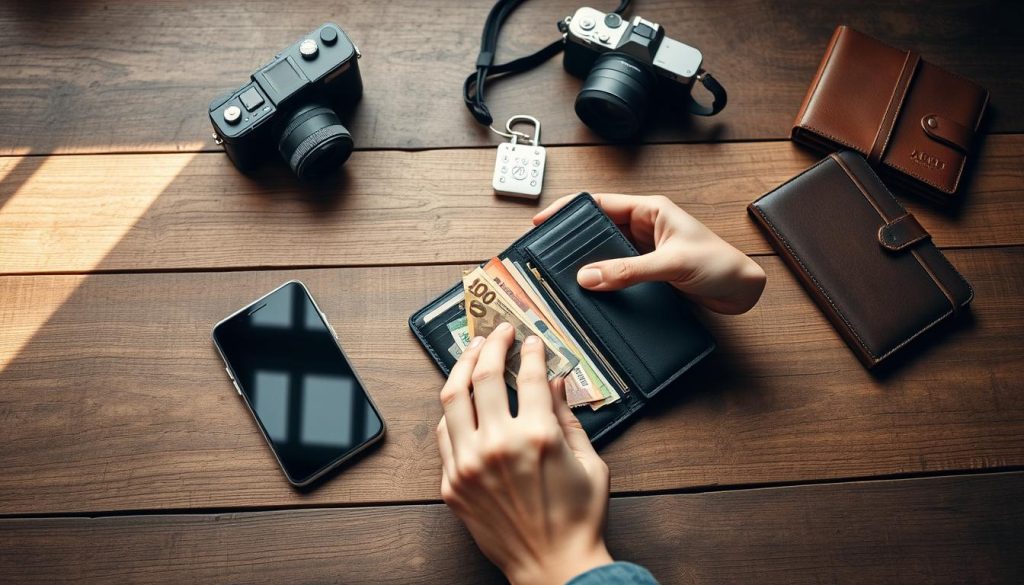
| Scenario | Best Option | Why It Works |
|---|---|---|
| Daily Expenses | Cash | Widely accepted, no extra fees |
| Hotel Bookings | Card | Secure, easy to track |
| Emergency Funds | Travel Card | Low fees, real-time conversion |
By following these tips, you can enjoy your trip without worrying about financial hiccups. Plan ahead, stay informed, and make the most of your travel experience.
Exchange Rates and Currency Conversion Strategies
Understanding exchange rates can save you money and stress during your trip. Whether you’re withdrawing cash or using a card, knowing how to get the best rate is essential. This section dives into strategies for comparing rates and locking in favorable conversions.
Comparing Official Rates with Travel Cards
Banks often offer official exchange rates, but these can include hidden fees and markups. Travel cards like Wise provide mid-market rates, which are often more competitive. For example, Wise allows fee-free spending in over 40 currencies, saving you money on every transaction.
Here’s a quick comparison:
- Bank Rates: Include fees and markups, making them less cost-effective.
- Travel Cards: Offer mid-market rates with lower costs and transparent fees.
Locking in Favorable Rates
Planning ahead can help you lock in a good rate before your trip. Use apps like XE Currency to monitor fluctuations and convert money when rates are favorable. This strategy is especially useful for larger expenses like hotel bookings or flights.
“Locking in a rate before your trip can save you up to 5% on currency conversion costs.”
By understanding these strategies, you can make smarter financial decisions and enjoy a stress-free travel experience.
Mozambique: Ultimate Travelers Guide to Currencies & Payments
Planning your finances ahead can make your journey seamless and hassle-free. Understanding the local currency and payment methods is crucial for a stress-free experience. Whether you’re exploring bustling cities or remote areas, being prepared ensures you stay within budget and avoid unnecessary fees.
Here’s a quick recap of what you’ve learned so far:
- The Mozambican Metical is the official currency, and cash is widely used for everyday transactions.
- Travel cards like Wise and Revolut offer competitive rates and low fees, making them ideal for managing your money abroad.
- Monitoring exchange rates and locking in favorable conversions can save you significant costs.
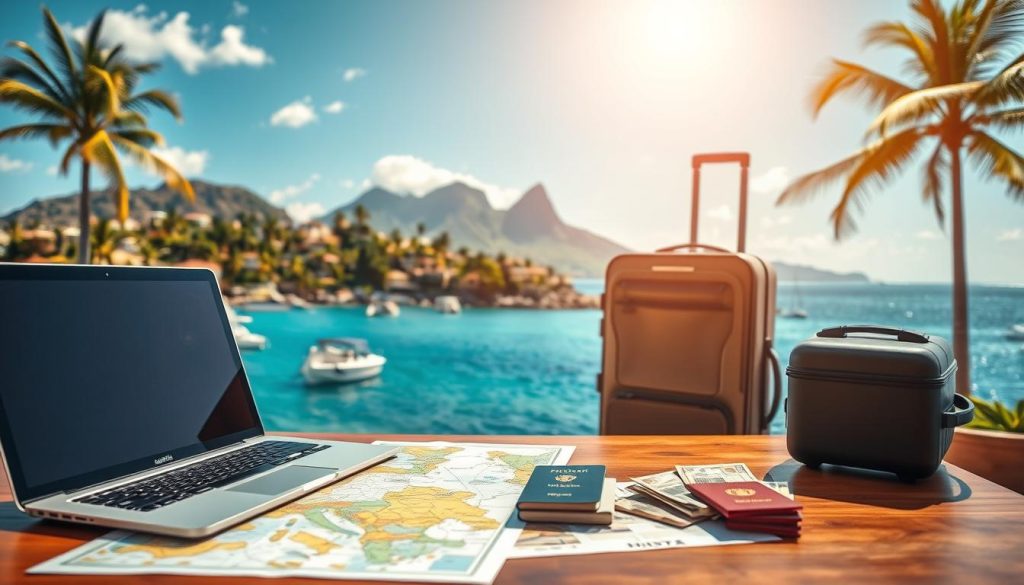
Using a travel card is one of the best ways to minimize fees and track your spending. These cards allow you to convert currency at mid-market rates, ensuring you get the most value for your money. Additionally, they provide a secure backup option in case of emergencies.
As you continue reading this guide, keep these essential tips in mind. They will help you optimize your financial planning and make the most of your trip. From managing ATM withdrawals to organizing your payment strategies, every step counts toward a smooth and enjoyable adventure.
Navigating Travel Cards and Payment Options
Travel cards can simplify your financial planning while abroad. They offer convenience, security, and cost savings, making them a popular choice for international trips. Whether you’re exploring bustling cities or remote areas, having the right card ensures you stay within budget and avoid unnecessary fees.
Wise Multi-Currency Card Features
The Wise Multi-Currency Card is a top choice for travelers. It allows you to hold and convert money in over 50 currencies at mid-market rates. This means you avoid hidden markups and save on currency conversion costs. The card also offers low transaction fees, making it ideal for everyday spending.
Another standout feature is its real-time notifications. You’ll receive updates on every payment or withdrawal, helping you track your spending easily. Plus, the card is accepted worldwide, ensuring you’re covered wherever you go.
Exploring Alternatives like Revolut
Revolut is another excellent option for travelers. Like Wise, it supports multiple currencies and offers competitive exchange rates. However, Revolut has some limitations, such as monthly withdrawal limits and additional fees for certain services.
Here’s a quick comparison of the two cards:
| Feature | Wise | Revolut |
|---|---|---|
| Currency Support | 50+ | 30+ |
| Transaction Fees | Low | Variable |
| Withdrawal Limits | Flexible | Monthly Cap |
Choosing the right card depends on your travel habits and needs. If you prioritize low cost and flexibility, Wise is a great choice. For those who prefer an all-in-one account with budgeting tools, Revolut might be better.
Travel cards are a safe and efficient way to manage your money abroad. They help you avoid extra fees, secure competitive rates, and enjoy peace of mind during your trip.
Handling ATM Withdrawals and Avoiding Unnecessary Fees
Smart ATM usage can save you money and hassle during your travels. Knowing how to navigate ATM withdrawals effectively ensures you avoid hidden fees and keep your spending under control. Here’s how to make the most of your card while minimizing costs.
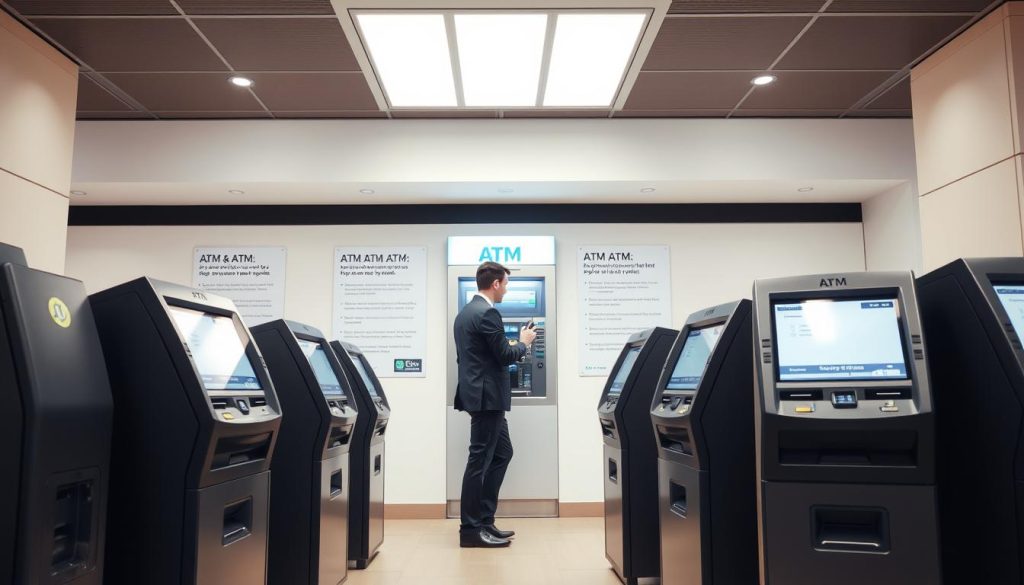
When to Use an ATM vs. Card Payments
Using an ATM is ideal for getting cash for small vendors or rural areas where cards aren’t accepted. However, for larger purchases or at hotels, paying with a card can be more convenient and secure. Always check for transaction fees before deciding.
Choosing the Right ATM
Not all ATMs are created equal. Look for machines affiliated with global networks like Visa or Mastercard, as they often charge lower fees. Avoid standalone ATMs in tourist areas, as they tend to have higher charges.
Strategies to Minimize Fees
- Withdraw larger sums less frequently: This reduces the number of withdrawal fees you incur.
- Always choose local currency: Opting for dynamic currency conversion (DCC) can lead to higher exchange rates and additional costs.
- Use your bank’s partner ATMs: Many banks have agreements with international networks, offering fee-free or low-cost withdrawals.
By following these tips, you can keep your money safe and avoid unnecessary fees. Planning ahead ensures a smoother and more cost-effective travel experience.
Planning Currency Exchange: Before and During Your Trip
Timing your currency exchange can make a big difference in your travel budget. Whether you exchange money before your trip or during your stay, understanding the options and fees can help you save money and avoid stress. Here’s how to plan your currency exchange effectively.
Pre-Travel Currency Exchange Options
Exchanging money before your trip has its advantages. Many banks and online providers offer competitive rates, and you’ll have local currency ready when you arrive. However, some providers charge flat fees or commissions, so compare options carefully.
For example, airport kiosks often have lower rates compared to banks or online services. Using an online provider could save you up to 7% on every $100 exchanged. Additionally, some travel cards allow real-time currency conversion, helping you lock in favorable rates before departure.
Local ATM and Bank Exchange Insights
Once you arrive, using local ATMs or banks can be a cost-effective way to get cash. Look for ATMs affiliated with global networks like Visa or Mastercard, as they typically charge lower fees. Avoid standalone ATMs in tourist areas, as they often have higher charges.
Here are some tips for local exchanges:
- Withdraw larger sums less frequently: This reduces the number of withdrawal fees you incur.
- Choose local currency: Opting for dynamic currency conversion (DCC) can lead to higher exchange rates and additional costs.
- Use your bank’s partner ATMs: Many banks have agreements with international networks, offering fee-free or low-cost withdrawals.
“Planning ahead and comparing rates can save you up to 5% on currency conversion costs.”
By understanding these strategies, you can make smarter financial decisions and enjoy a stress-free travel experience. Plan ahead, stay informed, and make the most of your trip.
Enhancing Security and Reducing Transaction Costs
Protecting your money while traveling is as important as planning your itinerary. From safeguarding your card details to avoiding hidden fees, taking proactive steps ensures a stress-free journey. Here’s how you can enhance security and keep your costs low.
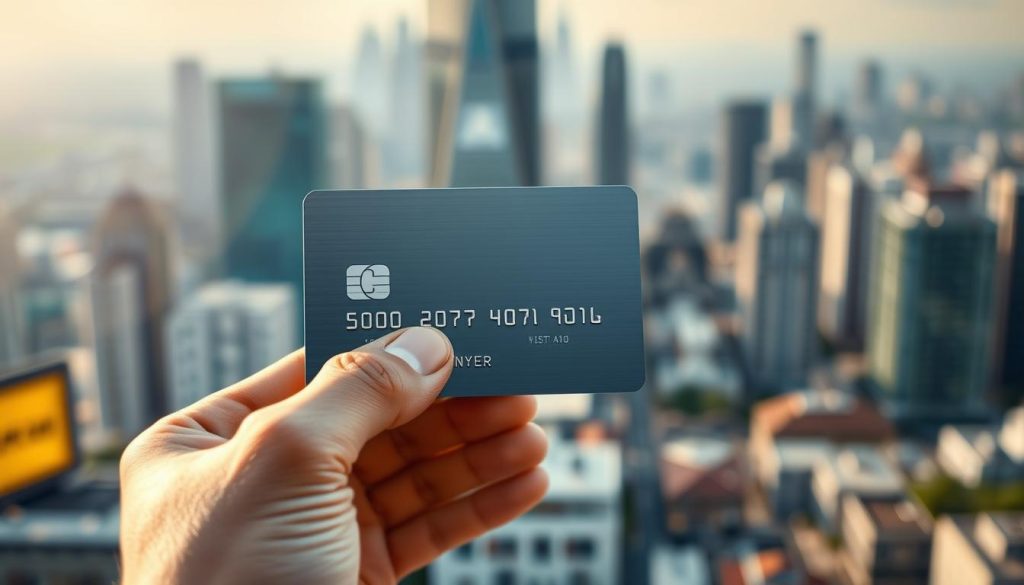
Card Security Practices
Using a travel card not linked to your primary account adds an extra layer of security. Enable two-factor authentication and instant transaction alerts to monitor every payment. This way, you can quickly spot any unauthorized activity.
Always notify your bank before your trip to avoid unexpected blocks. Carry a backup card in case of emergencies. These simple steps can save you from potential fraud and inconvenience.
Avoiding Fraud and Hidden Fees
Fraudsters often target travelers, especially at ATMs or during mobile payments. Stick to secure machines in well-lit areas and avoid sharing your PIN. When making purchases, use trusted platforms and verify the transaction details.
Review your account statements regularly to identify hidden fees. Some banks charge for foreign currency conversions or withdrawals. Opt for cards with low or no foreign transaction fees to save money.
“A secure payment method is your first line of defense against fraud and unnecessary expenses.”
Tips to Reduce Costs
- Compare fees: Choose cards with the lowest transaction and withdrawal fees.
- Use local currency: Avoid dynamic currency conversion (DCC) to get better exchange rates.
- Monitor spending: Track your money using budgeting apps to stay within your limits.
By following these practices, you can protect your funds and enjoy a hassle-free travel experience. Stay vigilant, plan ahead, and make the most of your journey.
Cost-Saving Strategies and Budget Travel Insights
Saving money while traveling doesn’t have to be complicated. With the right tools and strategies, you can minimize fees and make the most of your spending. Whether you’re exploring bustling cities or remote areas, these tips will help you stay within budget and avoid unnecessary costs.
Minimizing Foreign Transaction Fees
Foreign transaction fees can add up quickly. To avoid them, choose a travel card with low or no international fees. Cards like Wise or Revolut offer competitive exchange rates and transparent costs.
Always notify your bank before your trip to prevent unexpected blocks. This ensures your card works smoothly abroad. Additionally, using local currency for payments can save you from dynamic currency conversion charges.
Smart Spending and Backup Payment Methods
Monitoring your spending in real time is key to staying on budget. Apps like XE Currency or Mint help track money and identify areas to cut costs. For example, meals at local eateries often cost less than tourist restaurants.
Always carry a backup card or some cash for emergencies. This ensures you’re never stranded without a payment option. By planning ahead, you can enjoy your travel experience without financial stress.
“Small changes in spending habits can lead to significant savings over time.”
By following these strategies, you can make your trip more affordable and enjoyable. From choosing the right card to tracking your spending, every step counts toward a budget-friendly adventure.
Conclusion
Managing your finances while traveling doesn’t have to be stressful. By understanding the local payment methods and using the right tools, you can save time and money. Travel cards like Wise offer low fees and competitive exchange rates, making them a smart choice for your trip.
Always carry some cash for smaller transactions, especially in rural areas. Notify your bank before using your card to avoid unexpected blocks. Monitoring your spending with budgeting apps can help you stay on track.
With these tips, you can enjoy your journey with confidence. Explore more resources if needed, and make the most of your adventure with peace of mind.
The above is subject to change.
Check back often to TRAVEL.COM for the latest travel tips and deals.
